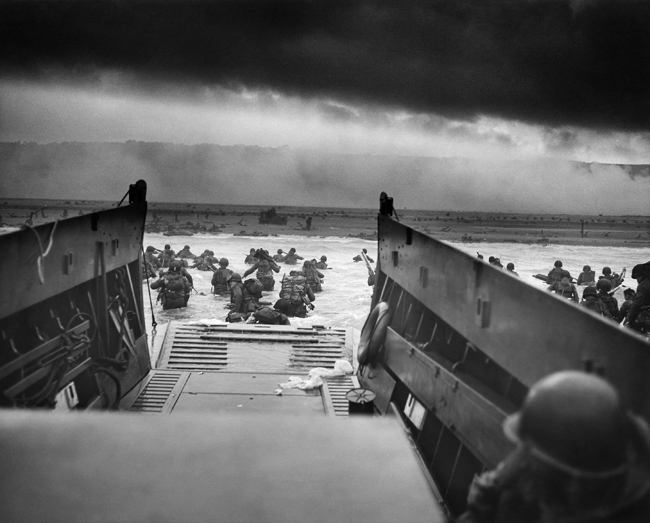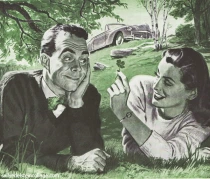It was June 1944. It was wartime.
While my father Marvin was spit-polishing his regulation army boots in the jungles of New Guinea, on the other side of the globe my teenage bobby soxer mother Betty polished up her saddles shoes in Brooklyn, N.Y. Though worlds apart, they both suffered – as did most Americans –from a bad case of jitters.
That June, America’s wartime nerves were completely jangled in anticipation of the long-awaited Allied landing in France. The plans to open a “Second Front” in the war had been in the works for years.
It was all top secret. No one knew where or when it was coming, just that a giant invasion was imminent. Rumors were rampant as was the nail-biting.
When D-Day finally did come most people were fast asleep.
Working the Swing Shift
Unless you were like Rosie the Riveter working the night shift at the defense plant, you likely wouldn’t learn the news until morning. Reports of the Normandy invasion were likely served up along with your morning eggs and war-rationed bacon.
That is unless you were a nocturnal creature like my 17-year-old future mother Betty. This high school senior was a lifelong night owl burning the midnight oil as usual on June 6th.
Mindlessly flipping through a brand new magazine named Seventeen, the radio played softly in the background. Suddenly at 12:41am the music on NBC radio was interrupted with the news flash that the invasion of Nazi-occupied Europe had begun.
Or had it?
When the long-awaited announcement came, my mother recalled, it was brief, simple, and in German. Quoting a report monitored in London, the Associated Press stated, “The German News Agency Transocean said today in a broadcast that the Allied invasion has begun.”
Betty raced to wake her parents up with the breaking news.
After so many false starts her parents were apprehensive, cautious to celebrate. Only a week ago a report had come over the radio from Sweden that the invasion had been going on for a week. The public panicked and worried about the whereabouts of sons and brothers, husbands, and friends. As false reports kept trickling in and eventually proven false, the public remained in suspense keeping nerves at fever pitch.
Skeptical, her father Arthur was unconvinced.
Like many, he didn’t trust this first report because Transocean was an official publication of the Nazi party. As the evening wore on radio announcers warned in the early bulletins that the news could be propaganda intended to lull partisan guerrillas in France and other German-occupied countries to lay down their arms thinking America and its allies had arrived to take their places.
Besides which only the night before President Roosevelt had spoken to the nation on the radio and offered no hint as to what would occur only a few hours later.
Fake News
There had been so many false starts.
Three days earlier on June 3 millions of Americans heard radio reports with breaking news from the Associated Press that the invasion had begun: “Flash…Eisenhower’s headquarters announces Allied landings in France.”
Noting the unconfirmed information, the CBS announcer told the audience to stay tuned. Less than three minutes later the Associated Press killed the erroneous story. Apparently, a new AP employee had made a practice tape about the invasion that was accidentally broadcast throughout America
It was too late.
The airwaves were soon filled with fake news. Radio stations NBC and the Mutual Broadcasting System followed CBS, reporting that D-Day had begun. In an instant, the “news” swept the nation. Shocked radio listeners telephoned friends. Jubilation, back-slapping, and celebration ensued.
Announcements were made at public and sporting events. A baseball-loving friend of the family attending a Giants and Pirates game at the Polo Grounds, recalled them pausing the game when the invasion was announced. “We interrupt this game to bring you a special announcement the Allies have invaded France.”
“The potency of the words stirred millions into electric activity,” reported the Brooklyn Daily Eagle the next day. Those words stayed with Betty’s doubting parents now.
Until there was firm confirmation her parents went back to sleep. With butterflies in her stomach, Betty stayed glued to the radio.
Finally at 3:32 am General Eisenhower’s London headquarters issued a statement confirming that the invasion in Normandy had begun. The Army Signal Corps, in a report called Communique Number One, said, “Under the command of General Eisenhower, Allied naval forces supported by strong air forces began landing Allied armies this morning on the northern coast of France.”
Betty listened attentively as General Eisenhower’s Order of the Day, a message recorded for the troops going into the invasion, was read over American radio stations.
You are about to embark on the great crusade toward which we have striven these many months. The eyes of the world are upon you… I have full confidence in your courage, devotion to duty and skill in battle.
Reading the report of the invasion, NBC correspondent Robert St. John said, “Men and women of the United States, this is a momentous hour in world history. This is the invasion of Hitler’s Europe. The zero hour.”
The long-awaited invasion of northwest Europe was underway.
D-Day had arrived
As dawn broke the predictable sounds of the clip-clop of the milkman’s horse making his rounds, belied the unpredictability that lay ahead.
It was to be anything but a usual day.
While New Yorkers slowly started their day, thousands of troops landed on the beaches of Normandy and had already been fighting for hours. As 160,000 Allied soldiers began to swarm the Normandy beaches on an ocean away, newspaper editors scrambled to put out a special early edition heralding a seminal moment of World War II.
Arthur pored over the special 6am edition of The N.Y. Times “Allied Armies Land in France in the Havre-Cherbourg Area,” the banner headline on the new front page said. “Great Invasion is Under Way.”
While her parents would stay hovered around the radio, Betty and her older sister Judy decided to head into the city.
The steamy subway was jam-packed with other anxious Americans. Some were going to rallies, some to places of worship for specially scheduled services to pray, some just to be around other citizens, and some to Times Square to watch the D-Day news break on the Times Ticker, the electric news ticker, “The Zipper” that displayed headlines within a minute of a story breaking.
There was a huge D-Day rally that afternoon in Madison Square Park held by WNYC featuring speeches and songs presided over by the city’s mayor Fiorello La Guardia. Thousands would attend. Huddled together there was much cheering, tempered by the somber reality of the grave losses that would lay ahead.
La Guardia led the city in prayer, telling those gathered—and those listening at home on their radios:
We, the people of the City of New York, in meeting assembled, send forth our prayers to the Almighty God for the safety and spiritual welfare of every one of you and humbly petition Him to bring total victory to your arms in the great and valiant struggle for the liberation of the world from tyranny.
Thoughts and Prayers
That night like millions of others Betty and her family listened attentively as President Roosevelt went on the radio addressing the American people directly for the first time.
Because the date and timing of the Normandy invasion had been so top secret, during the national radio broadcast the night before 5 about the Allied liberation of Rome, President Roosevelt had made no mention of the Normandy operation, already underway at that time.
Now the President felt the need to explain his earlier silence.
Shortly before he went on the air, he added several handwritten lines to the opening of his speech that addressed that point. “Last night, when I spoke to you about the fall of Rome, I knew at that moment that troops of the United States and our allies were crossing the Channel in another and greater operation. It has come to pass with success thus far.”
The President’s address itself was truly a prayer with Roosevelt asking God to bless the American work effort. He called on the American people to continue their prayers into the coming day.
For the duration of the war, there would be a lot of thoughts and prayers.
Now on the 80th anniversary of D-Day, we recall with pride and respect the sacrifices made by the men and women who participated in what is still the largest naval air and land operation in history.
With gratitude to the greatest generation!
Copyright (©) 2024 Sally Edelstein All Rights Reserved






















